#Luisa Adele Rosa Maria von Amman
Explore tagged Tumblr posts
Photo
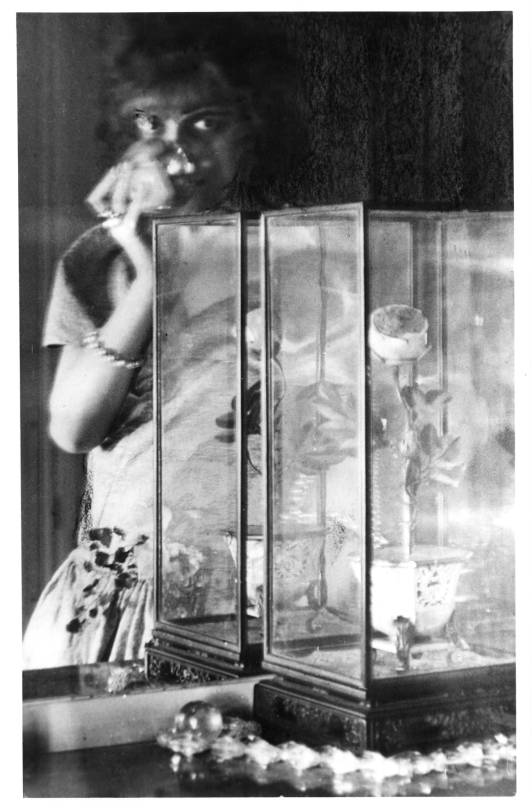
1922 Man Ray, Marchesa Luisa Casati.
"In 1922, Luisa visited a young and still unknown photographer named Man Ray. In his autobiography, the American tells the story of the photo that became the most famous of all the representations of the Marchioness Casati (...) "I drew a few where one could distinguish a semblance of face; On one of the negatives, we saw three pairs of eyes. It could have been mistaken for a surreal version of the Medusa. It was precisely this photo that delighted her: I had made a portrait of her soul, she said, and she ordered dozens of copies from me. I wish my other clients had been so easy to please. The photo of the marquise went around Paris. Figures from the most closed circles began to come, all expecting miracles. I had to leave my hotel room and find a real studio. » (x)
#1922#portrait#man ray#marchesa luisa casati#luisa casati#marchesa casati#marquise casati#Marquise luisa casati#la Marquise#luisa amman casati#Luisa Adele Rosa Maria von Amman#Luisa Adele Rosa Maria Amman#Luisa Amman#Marquise Casati Stampa di Soncino#Marchesa Casati Stampa di Soncino#Luisa Marchesa Casati Stampa Di Soncino#Luisa Casati Stampa di Soncino#Marchesa Casati Stampa
191 notes
·
View notes
Photo
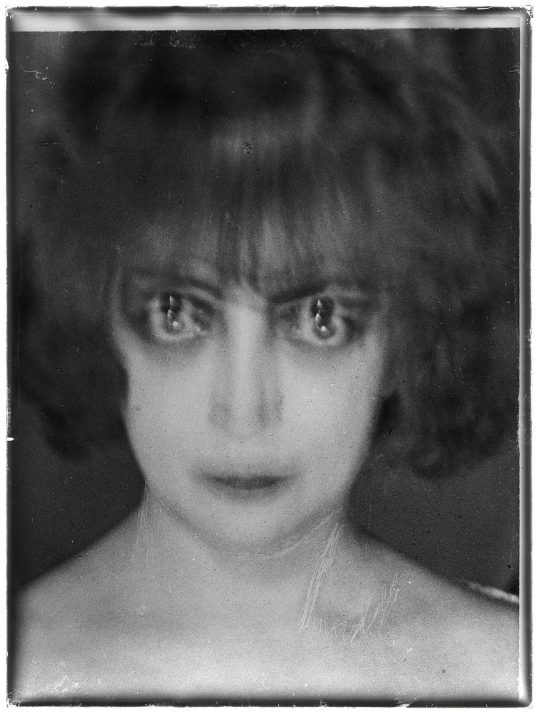
1922 Man Ray, Marchesa Luisa Casati.
"In 1922, Luisa visited a young and still unknown photographer named Man Ray. In his autobiography, the American tells the story of the photo that became the most famous of all the representations of the Marchioness Casati (...) "I drew a few where one could distinguish a semblance of face; On one of the negatives, we saw three pairs of eyes. It could have been mistaken for a surreal version of the Medusa. It was precisely this photo that delighted her: I had made a portrait of her soul, she said, and she ordered dozens of copies from me. I wish my other clients had been so easy to please. The photo of the marquise went around Paris. Figures from the most closed circles began to come, all expecting miracles. I had to leave my hotel room and find a real studio. » (x)
#1922#portrait#photography#man ray#marchesa luisa casati#luisa casati#la casati#la marquesa#marquise casati#casati#marchesa casati#Marchesa Casati Stampa#luisa amman casati#Luisa Adele Rosa Maria von Amman#Luisa Amman#Luisa Adele Rosa Maria Amman#amman#Marquise Casati Stampa di Soncino#Marchesa Casati Stampa di Soncino#Luisa Marchesa Casati Stampa Di Soncino#Luisa Casati Stampa di Soncino#la Marquise#Marquise luisa casati#marquise#medusa#soul#emmanuel radnitzky#master photographer
65 notes
·
View notes
Photo
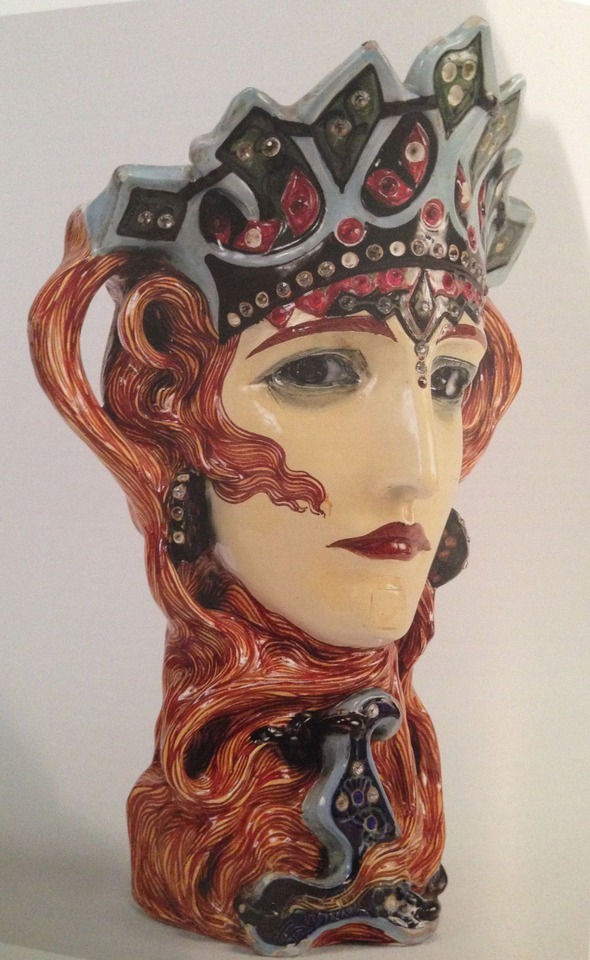
1920 Renato Bertelli, Marchesa Luisa Casati in Medusa Mask, Ceramic glazed ceramic with brilliant cut glass applications, h 37 cm, Ceramic Factory Salvini Ro, Ferrara, Cavallini Foundation.
#1920#mask#ceramic mask#medusa mask#renato bertelli#marchesa casati#luisa casati#marchesa luisa casati#la casati#la marchesa#la marquise#luisa amman#marquise casati#Marchesa Casati Stampa#Marquise Casati Stampa di Soncino#Marchesa Casati Stampa di Soncino#Luisa Marchesa Casati Stampa Di Soncino#Luisa Casati Stampa di Soncino#luisa amman casati#Luisa Adele Rosa Maria von Amman#Luisa Adele Rosa Maria Amman#Marquise luisa casati#marquise
34 notes
·
View notes
Photo

1920 Romaine Brooks, Marchesa Luisa Casati.
"Between Luisa and Romaine Brooks, it started as a game. True to her habits, Luisa had sought to surround herself with all that the island could count of marginals and artists (...) Luisa, who had an unfortunate tendency to think that money could buy everything, ordered a painting. His portrait. Romaine refused. (...) Romaine, running out of argument, claimed that she painted only nudes. Never mind, Luisa would take off her clothes. (...) It was Roman who succumbed. Luisa didn't see him. Luisa wanted to seduce Romaine, while Romaine already loved her. Initially, she acts awkwardly. Sometimes nervous, sometimes stultified by spending whole afternoons on Adelswärd-Fersen's couch in a state halfway between orgasm and coma. A latent and unfulfilled desire made her irascible. Was she excited about the idea of having a lesbian experience? Romaine had refused to paint it. Perhaps more than anything, this is what sparked his desire. » (x)
#1920#romaine brooks#marchesa luisa casati#casati#luisa casati#marchesa#marquise#marchesa casati#marquise casati#Marchesa Casati Stampa#Luisa Amman#Luisa Adele Rosa Maria Amman#Luisa Adele Rosa Maria von Amman#luisa amman casati#Luisa Casati Stampa di Soncino#stampa#Luisa Marchesa Casati Stampa Di Soncino#Marquise Casati Stampa di Soncino#Marchesa Casati Stampa di Soncino#la marquise#la marchesa
49 notes
·
View notes
Photo



This is a magazine shot of Georgina Chapman doing her best impression of the early 20th. century Italian heiress, Marchesa Luisa Casati.
"Marchesa's Moment" Georgina Chapman as Marchesa Luisa Casati by Peter Lindbergh for Harpers Bazaar March 2009.
Known for having eccentric taste in fashion (she often wore live snakes as jewelry and kept pet cheetahs in her many residences), she was obsessed with the prospect of death after losing so many loved ones at an early age and commissioned artists to immortalize her through works of art.
She was, at once, frightening and magnetic. A complex and dark character who was also intensely private despite being a socialite and a muse to many. And yes, the fashion line Marchesa is named after her. (x)
#2009#marchesas moment#fashion shoot#peter lindbergh#georgina chapman#bazaar march#harpers bazaar#march 2009#snake#chapman#lindbergh#luisa casati#marchesa luisa casati#marchesa casati#marquise casati#Marchesa Casati Stampa#casati#Luisa Amman#Luisa Adele Rosa Maria Amman#Luisa Adele Rosa Maria von Amman#luisa amman casati#amman#Luisa Casati Stampa di Soncino#Luisa Marchesa Casati Stampa Di Soncino#Marchesa Casati Stampa di Soncino#Marquise Casati Stampa di Soncino
29 notes
·
View notes
Photo

1918 Kees Van Dongen, La Casati (Marchesa Luisa Casati).
"Kees immediately wanted a piece of Luisa and barely hid from it. This seemingly untactical appetite had seduced the woman, flattered by the harshness of the man's desire. What the Marchioness did not understand was that the attraction she had exerted on Cornelis Theodorus Marie Van Dongen of his real name was due in large part to his fortune. The poor painter's fascination with the rich heiress, if she was interested, was no less sincere. Luisa had taken him out of the Bateau-Lavoir (...) The Marquise introduced him to the beautiful world and Kees Van Dongen became the portraitist of the Tout-Paris. She did not ask for the exclusivity of her lover's caresses, on the contrary, she was delighted that he moved in with Jasmy Jacob called "the Divine." (x)
#1918#painting#kees van dongen#la casati#marchesa luisa casati#la marquesa#la marquesa luisa casati#La Marquise Casati#la marchesa#la marchesa luisa casati#luisa casati#marquise casati#marchesa casati#Marchesa Casati Stampa#Luisa Casati Stampa di Soncino#Luisa Marchesa Casati Stampa Di Soncino#Marchesa Casati Stampa di Soncino#Marquise Casati Stampa di Soncino#luisa amman casati#Luisa Adele Rosa Maria von Amman#Luisa Adele Rosa Maria Amman#Luisa Amman#amman#eccentrics#the quai#the quai venice#venice
53 notes
·
View notes
Photo

1919 Augustus John, Portrait of Marchesa Luisa Casati.
Art Gallery of Ontario.
Augustus John met Casati at a party hosted in Paris by a mutual friend, Maria Ruspoli, and the two became lovers. In his memoirs, John described first meeting her:
"Her bearing, personality and peculiar elegance seemed to throw the rest of the company into the shade... The newcomer wore a tall hat of black velvet, the crown surrounded by an antique gold torque, the gift of D'Annunzio; her enormous eyes, set off by mascara, gleamed beneath a framework of canary coloured curls... She moved around the ballroom with supreme ease, while looking about her with an expression of slightly malicious amusement."
At this time Marchesa Luisa Casati had already bedded a number of famous artists, and had been a subject for many others. Rather than present her in one of the mythological guises other artists had, John chose to try and capture her flamboyant, but at the same time guarded personality. It depicts the Marchesa with fiery red hair, highlighted by a muted background, that might depict a stormy view of the Italian Alps near her home. (x)
“In February, she met Augustus John at the Duchess of Gramont's (…) a famous painter and womanizer. At the end of dinner, she ordered a painting, and the next day they became lovers. Time for a first, then a second canvas. One might think that Luisa acted with men as with her dresses, she loved them excessively then put them away without further ado. I'm not sure. Her husband, Gabriele, Kees then Augustus, maybe another artist or two. For an independent woman who spent her life in parties and orgies, at a time when the high society had the freest morals possible, her hunting record is rather meager; Luisa was immensely lonely. A woman too extravagant, too delirious to be loved, buying attention, friends with splendid parties, the glances with spectacular outfits and the inspiration of the painters with knocking and stumbling pieces. » (x)
#1919#portrait#augustus john#marchesa luisa casati#luisa casati#luisa amman#marchesa#marquise#la marquise#la marchesa#casati#marchesa casati#Marchesa Casati Stampa#marquise casati#Amman#Luisa Adele Rosa Maria Amman#luisa amman casati#Luisa Adele Rosa Maria von Amman#Luisa Casati Stampa di Soncino#Luisa Marchesa Casati Stampa Di Soncino#Marquise Casati Stampa di Soncino#Marchesa Casati Stampa di Soncino
47 notes
·
View notes
Photo

Marchesa Luisa Casati, circa 1915
Luisa Casati (1881- 1957), Italian heiress, muse, and patroness of the arts in early 20th-century Europe. Ca. 1915.
#1915#photography#marchesa luisa casati#Luisa Casati Stampa di Soncino#la marcehsa casati#la marquise#la luisa#casati#stampa#casati stampa#amman#luisa amman#luisa amman casati#Luisa Adele Rosa Maria von Amman#Luisa Adele Rosa Maria Amman#Marquise Casati Stampa di Soncino#Marchesa Casati Stampa di Soncino#Luisa Marchesa Casati Stampa Di Soncino#Marchesa Casati Stampa#Marquise luisa casati#marquise#marquise casati#costume
25 notes
·
View notes
Photo

1914 Kees van Dongen, La marquise Luisa Casati (Marchesa Luisa Casati).
Photo: Artnet
#1914#painting#portrait#kees van dongen#la marquise luisa casati#luisa casati#Marchesa Luisa Casati.#marchesa#Marchesa Casati Stampa#marchesa casati#marchesa luisa casati#la marchesa#La Marquesa#La Marquise Casati#la marquesa luisa casati#luisa amman casati#Luisa Adele Rosa Maria von Amman#Luisa Adele Rosa Maria Amman#Luisa Amman#amman#Marquise Casati Stampa di Soncino#Marchesa Casati Stampa di Soncino#Luisa Marchesa Casati Stampa Di Soncino#Luisa Casati Stampa di Soncino#marquise casati#casati#luisa von amman#von amman#1914 painting
27 notes
·
View notes
Photo

1927 Alberto Martini, Marchesa Luisa Casati as Medusa.
#1927#medusa#alberto martini#marchesa luisa casati as medusa#marchesa luisa casati#martini#luisa casati#marquise casati#marchesa casati#luisa amman casati#Luisa Adele Rosa Maria von Amman#Luisa Adele Rosa Maria Amman#Luisa Amman#Amman#Marquise Casati Stampa di Soncino#Marchesa Casati Stampa di Soncino#Luisa Marchesa Casati Stampa Di Soncino#stampa#Luisa Casati Stampa di Soncino#Marchesa Casati Stampa#la marquesa luisa casati#marquese de casati#la marquesa casati#La Marquesa#marquesa casati
26 notes
·
View notes
Photo

1942 Carl L.T. Reitlinger, Marchesa Luisa Casati, London
#1942#portrait#photography#Carl L.T. Reitlinger#la marchesa casati#london#reitlinger#luisa casati#marchesa casati#marchesa#Marchesa Luisa Casati.#Marchesa Casati Stampa#marchesa luisa casati#marquise casati#luisa amman casati#Luisa Adele Rosa Maria von Amman#Luisa Adele Rosa Maria Amman#Luisa Amman#amman#Marquise Casati Stampa di Soncino#Marchesa Casati Stampa di Soncino#Luisa Marchesa Casati Stampa Di Soncino#Luisa Casati Stampa di Soncino
20 notes
·
View notes
Photo

1925 Alberto Martini, The Marchesa Luisa Casati as Cesare Borgia. Crayon, 280 x 125 cm.
Private Collection Audouy.
#1925#costume sketch#illustration#alberto martini#martin#cesare borgia#crayon#costume#Private Collection Audouy#marchesa luisa casati#Luisa Casati Stampa di Soncino#Marchesa Luisa Casati.#luisa casati#marquise casati#marchesa casati#Marchesa Casati Stampa#luisa amman casati#Luisa Adele Rosa Maria von Amman#Luisa Adele Rosa Maria Amman#Luisa Amman#amman#Marquise Casati Stampa di Soncino#Marchesa Casati Stampa di Soncino#Luisa Marchesa Casati Stampa Di Soncino
21 notes
·
View notes
Photo

1900 Paul César Helleu, Marchesa Luisa Casati.
#1900#painting#paul césar helleu#marchesa luisa casati#helleu#luisa casati#marquise casati#marchesa casati#Marchesa Casati Stampa#luisa amman casati#Luisa Adele Rosa Maria von Amman#Luisa Adele Rosa Maria Amman#Luisa Amman#Amman#Marquise Casati Stampa di Soncino#Marchesa Casati Stampa di Soncino#Luisa Marchesa Casati Stampa Di Soncino#Luisa Casati Stampa di Soncino
20 notes
·
View notes
Photo
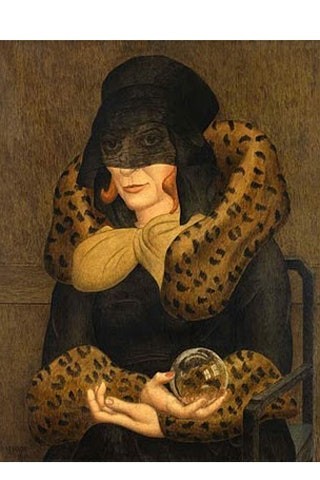
1934 Francis Hastings, 16th Earl of Huntingdon, Portrait of Marchesa Luisa Casati.
Lord Huntingdon's (Francis Hastings, 16th Earl of Huntingdon) first marriage was to Cristina Casati, daughter of Camillo, Marquis Casati Stampa di Soncino by his wife, the artistic muse Marchesa Luisa Casati, in 1925; they had one daughter Lady Moorea Hastings.
There is a portrait of Luisa painted by Hastings in 1934. Definitely Cristina's idea to break the ice between mother and son-in-law. I wonder what kind of relationship Luisa had with her daughter. Aside from their tempered characters and lack of love, they had nothing in common. Family patterns are made to be reproduced. Luisa revived Cristina, and Cristina Moorea, the childhood of loneliness and abandonment from which they had suffered so much. I don't like Hastings' painting. She holds a crystal ball and, behind her veil, her gaze is that of a slightly stultified witch. As long as the painter has talent, a painting does not lie. If Luisa didn't love her son-in-law, he would return it to her. » lx)
#1934#portrait#earl of huntingdon#francis hastings#marchesa luisa casati#luisa casati#la casati#la marchesa#la marquise#casati#amman#marquise casati#marchesa casati#Marchesa Casati Stampa#Luisa Adele Rosa Maria von Amman#Luisa Adele Rosa Maria Amman#Luisa Amman#Marquise Casati Stampa di Soncino#Marchesa Casati Stampa di Soncino#Luisa Marchesa Casati Stampa Di Soncino#Luisa Casati Stampa di Soncino#Marquise luisa casati#Marquise de Chabannes#marquise#marquesa casati#Viscount Hastings#Lord Huntingdon#Cristina Casati#Cristina Casati Stampa di Soncino
13 notes
·
View notes
Photo
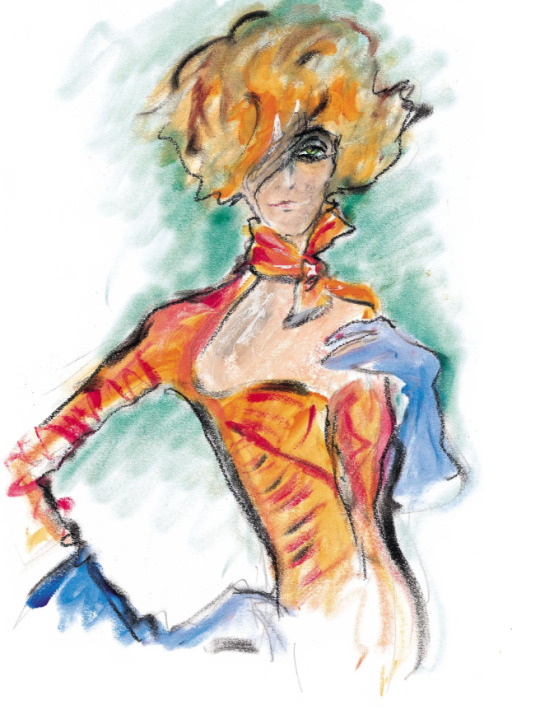
Master of Sketches: Design sketch by Karl Lagerfeld. To reinvent Marchesa Luisa Casati, the designer channelled her idiosyncratic spirit in a series of sketches and photographs of Carine Roitfeld, the editor of French Vogue:
“She has the same bone structure and wildly daring fashion sense,” Lagerfeld says. “She plays a modern Casati, but the drama of Casati was that she was not playing.”
Karl Lagerfelds sketch of Carine Roitfeld, the editor of French Vogue in an evening dress by Gucci.
#2003#design sketch#sketch#karl lagerfeld#marchesa luisa casati#drama#gucci dress#gucci#luisa casati#marchese casati#luisa amman#Marquise Casati Stampa di Soncino#Marchesa Casati Stampa di Soncino#Luisa Casati Stampa di Soncino#Marchesa Casati Stampa#Luisa Marchesa Casati Stampa Di Soncino#luisa amman casati#Luisa Adele Rosa Maria von Amman#Luisa Adele Rosa Maria Amman#Marquise luisa casati#la Marquise#marquise casati#stampa#casati#amman#roitfeld#lagerfeld
11 notes
·
View notes
Quote
Tall and gaunt with heavily made-up eyes, Marchesa Luisa Casati represented a past age of splendour when a few beautiful and wealthy women adopted an almost brutally individualistic way of living and presenting themselfes to the public.
Elsa Schiaparell
#quote#elsa schiparelli#schiaparelli#schiaparelli quote#past age#past age quotes#splendour#splendour quote#wise quotes#life quotes#wise#marchesa luisa#casati#la casati#marchesa casati#la marquise#marquise casati#Marquise luisa casati#luisa amman casati#Luisa Adele Rosa Maria von Amman#Luisa Adele Rosa Maria Amman#Luisa Amman#marquise#Marquise Casati Stampa di Soncino#Marchesa Casati Stampa di Soncino#Luisa Marchesa Casati Stampa Di Soncino#Luisa Casati Stampa di Soncino#Marchesa Casati Stampa
13 notes
·
View notes